
Maximizing quality of life in glaucoma
Quality-of-life issues have stepped into the spotlight for glaucoma, and ophthalmologists are learning how to incorporate new insights and tools into their clinical practice.
Quality-of-life issues have stepped into the spotlight for glaucoma, and ophthalmologists are learning how to incorporate new insights and tools into their clinical practice.
A question-and-answer session at the American Academy of Ophthalmology 2019 annual meeting focused on a discussion of these issues.
Panelists included:
- Anjali M. Bhorade, MD, MSCI, associate professor of ophthalmology, Washington University School of Medicine, St. Louis;
- Pandeep Y. Ramulu, MD, PhD, the Sheila K. West Professor of Ophthalmology, Johns Hopkins University, Baltimore;
- Qi N Cui, MD, assistant professor, Scheie Eye Institute, University of Pennsylvania, Philadelphia; and
- Dana Blumberg, MD, associate professor of ophthalmology, Columbia University Medical Center, New York.
Kelly Walton Muir, MD, associate professor of Ophthalmology, Duke Eye Center, Durham, NC, and Brian Samuels, MD, PhD, associate professor Ophthalmology, University of Alabama at Birmingham, Hoover, AL, co-chaired the panel discussion.
How does medical therapy, such as beta-blockers and alpha-agonists, impact falls and how ocular surface disease affects reading fluency in glaucoma patients?
Dr. Ramulu: “In our practice, we have looked at that and generally have not found that the different types of eye drops affect most types of functional outcomes. That is not to say that they are not important. The drugs do plenty of other things. We have found in some cases that alpha-agonists, for example, cause people to stay at home more. I think the bigger question is how do we counter those impacts. The first thing we want to do is keep people functional, but we can’t let our treatment end there. If that is all we are doing, I am not sure we are doing a very good job.”
Dr. Bhorade: “I agree. Studies have been inconsistent with how the medications might be affecting falls. One study showed that beta-blockers might be associated with an increased risk of falls; however, several other studies have not found that same association. It is difficult to assess if certain glaucoma medications impact visual function.”
When do the panel members refer patients to low-vision resources and are the low-vision resources tailored depending on the visual field?
Dr. Bhorade: “It is really important for us to realize that referrals to low-vision resources should occur early in the disease. Often, we have patients who have advanced disease and who can barely see, and then we think about low-vision resources. However, it is very important to start low-vision [rehabilitation] early because numerous studies have shown that decreases in visual function are actually happening during the earlier stages than the advanced stage.”
Dr. Ramulu: “If clinicians talk to low-vision practitioners, they say that patients with early disease are the ones that can be helped the most. When a patient has no light perception in both eyes, you are talking about sensory substitution and entirely different ways of doing things. This is a lot harder than optimizing the vision of a patient with some vision.”
Dr. Cui: “If my patient has vision worse than 20/40, I usually will refer them [to a low-vision specialist] relatively early, or if they are starting to have any visual complaints, especially regarding peripheral vision, driving, and reading, I will refer them early.”
How would a physician distinguish between physician expectations and patient expectations regarding a micro-invasive glaucoma surgery (MIGS) procedure if the physician enthusiastically promoted a MIGS procedure that achieved only a 1- or 2-point difference in the patient’s IOP but the patient reported a placebo effect in their quality-of-life assessment?
Dr. Cui: “This is always an issue with health-related quality-of-life questionnaires. When we assemble a questionnaire, we discuss extensively how to preclude that [placebo effect.] In some ways, you can argue that as soon as the patients are seeing a physician, their opinions and thoughts about their disease process are already being impacted by the physician’s comments. It may not be possible to completely separate the two. We are hoping that by evaluating the patient quality of life at different time intervals before insertion of MIGS and a few months after insertion of MIGs, we can see whether there is a real change in their quality-of-ilfe perception with respect to having undergone the surgery.”
Do the panel members consider earlier cataract extraction in these patients to try to improve their visual function sooner or to see if there is even a small improvement in facial recognition and reading? Do the panel members think the quality of life can be optimized sooner?
Dr. Blumberg: “Since we know that contrast sensitivity is impaired in glaucoma, we definitely look to maximize any other causes of visual impairment or causes of [decreased] contrast sensitivity [by] improving the surface and earlier cataract surgery.”
Dr. Ramulu: “I agree. I don’t know whether it is earlier. If someone has very advanced glaucoma, usually we will raise our threshold for cataract. At the same time, we have to understand that almost all of our treatments cause cataracts. We are in the field of generating cataracts as much as we are of preventing glaucoma, and so we have to be aware of that and treat aggressively, so that we don’t make the morbidity of the disease worse than the disease itself.”
Dr. Bhorade: “I have changed how I practiced over the years to think more about optimizing vision in these patients. In patients with glaucoma and mild-to-moderate cataract, I might have a lower threshold for removing the cataract if they are having any complaints just to optimize their vision.”
Newsletter
Don’t miss out—get Ophthalmology Times updates on the latest clinical advancements and expert interviews, straight to your inbox.





























